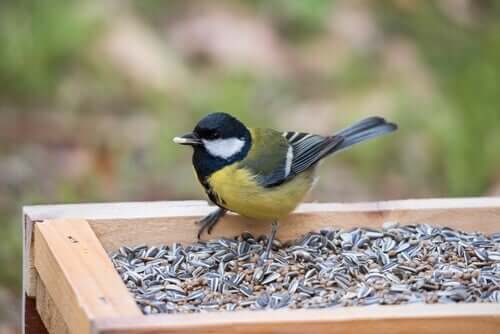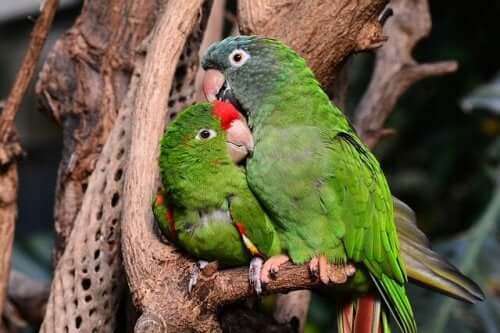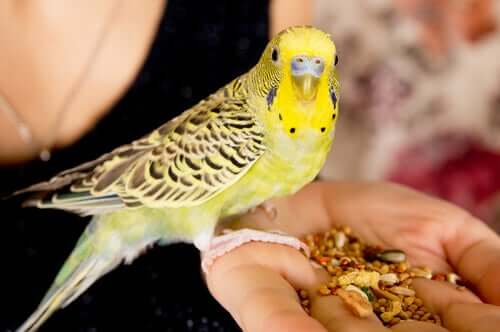Toxic Types of Food Your Birds Should Never Eat

Before you begin to develop a balanced diet for your birds, you need to know that there are some types of toxic food they should never eat. So, it’s crucial that you know the essential nutrients their diet requires in order to promote their proper development. In contrast, you must also be familiar with ingredients that can compromise their health. In short, there are some types of food humans eat that could poison a bird. So, keep this in mind to avoid any tragedies.
That said, let’s see what these toxic ingredients are that we’ve just mentioned.
The term “bird” encompasses a very diverse and extensive group of vertebrate animals, many of which can fly. Birds are very different when it comes to anatomy and physiology. This explains why each species adapted to specific climates, lifestyles, and diets.
So, before you choose the best diet for your birds, you must really know what type of food their bodies are best adapted to. At the same time, you should also find out what types of food are toxic to their particular species.
What do birds eat?

Bird feeding can mean a lot of things. For the purpose of this article, we mean widely varied diets. For instance, there are carnivorous, insectivorous, granivorous, and frugivorous birds. Each one of these organisms long adapted to a diet that takes into consideration the shape of their beak and their digestive system.
Largely, this variety is due to the need for animals to adapt to different habitats. Obviously, the more benevolent the weather, the larger the quantity, and variety of food available.
The influence of the climate and the area
The most common tropical and temperate climates species have a varied natural diet. This is unlike other species who adapted to arid climates, and seabirds.
Parrots and pigeons can adapt to nearly all kinds of food, including fruits, seeds, leaves, and grains. Of course, this explains why these birds were the ones who adapted best to domestic life. It also demonstrates how they can survive in big cities.
A bird’s diet also varies according to their stage of life. Most of them feed on insects brought by their mother when they’re still young. These are their main source of protein, and allow the proper development of their muscles and feathers.
When a bird reaches adulthood, their body must quickly adapt to any conditions imposed by their given environment. While some become expert hunters on land or at sea, others reap the seeds and fruits of their region.
The environment is extremely favorable to the adaptation of domestic birds. Even so, you must respect the preferences and food intolerances of each species. Especially when it comes to poisonous food for birds.
Toxic types of food your birds should never eat

Birds born and raised in captivity lose much of their instinct. Therefore, they may accidentally eat toxic food if it’s within their reach.
Here are the most toxic types of food you shouldn’t feed your birds or leave around them.
Chocolate is one of the toxic types of food for birds
Chocolate is potentially toxic to all animals, including humans. Some digestive systems are more intolerant of these substances and it might lead to vomiting and diarrhea. In more severe cases, the central nervous system goes out of whack and the bird could die as a consequence.
Apple seeds, pears, cherries and peaches
The seeds of apples, cherries, pears, and peaches all have small amounts of cyanide. This is a highly poisonous mineral for most animals, and birds are no exception. The pulp of these fruits is highly recommended in their diet though, just take out the seeds.
Avocados are among the toxic types of food for birds
This is another example of a fruit that’s toxic for birds so you shouldn’t put it in their dishes. Among other things, because it comes with a high risk of heart and liver failure.
Garlic and onion
Garlic and onions are very good for humans and you can feed them in small doses to dogs and cats. However, their ingestion usually leads to digestive problems accompanied by vomiting and diarrhea when it comes to birds.
Alcohol
This one is sort of obvious, just don’t give alcohol to any pet and don’t keep it within their reach. This substance depresses the immune system and leads to a rapid decline in their health.
Stalks, leaves and tomato seeds
Tomato pulp is tasty and healthy for birds. However, their leaves, stems, and seeds are toxic. So, you must carefully clean the tomatoes before you feed them to your bird.
Salt and sugar
All animals should consume a certain amount of sodium and sugar through their natural diet. However, the consumption of these processed substances could be fatal to their health. They may lead to digestive problems and kidney damage.
Thanks for reading.
All cited sources were thoroughly reviewed by our team to ensure their quality, reliability, currency, and validity. The bibliography of this article was considered reliable and of academic or scientific accuracy.
- Shivaprasad, H. (2014) Patología de las Aves – Una Revisión. Recuperado el 4 de enero de 2022, disponible en: https://www.asav.es/wp-content/uploads/2016/05/3-1-Patologia-de-las-aves-una-revision-Shivaprasad.pdf
- Skelhorn, J., & Rowe, C. (2010). Birds learn to use distastefulness as a signal of toxicity. Proceedings of the Royal Society B: Biological Sciences, 277(1688), 1729-1734.
- RICHARDSON, J. A. (2006). Toxic Substancesen Harrison G. & Lightfoot, T. Clinical Avian Medicine (Vol. II). Spix Publishing.
- Kovalkovičová, N., Šutiaková, I., Pistl, J., & Šutiak, V. (2009). Some food toxic for pets. Interdisciplinary toxicology, 2(3), 169.
